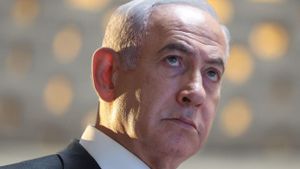The war between Russia and Ukraine continues to descend from geopolitical tensions to painful realities, marking another brutal chapter of conflict. With the recent escalation, Russia's missile attacks focus not only on military targets but also indiscriminately strike civilian areas. On November 11, 2024, the quiet city of Kryvyi Rih was jolted awake when missiles rained down on residential buildings, tragically ending the lives of a mother and her three children, the youngest being less than one year old. These latest attacks, part of Russia's relentless campaign against Ukraine, serve as stark reminders of the war's devastating cost on human life.
Ukrainian President Volodymyr Zelenskyy expressed his grief and outrage on social media, condemning the attacks as terror aimed squarely at civilians. "Every day, every night, Russia unleashes the same terror," he lamented. A local community now grapples with mourning the loss and helping those injured, including children caught in the chaos. This tragedy is just one example of the immense civilian toll amid intensified military operations.
On the military front, the situation is equally fraught with danger. Ukrainian defense forces have heightened their readiness, especially as reports indicate potential renewed assaults from Russian troops focused on southern Ukraine. Spokesperson Vladyslav Voloshyn noted the movement of trained assault groups indicating Russia's preparation for significant offensive operations, particularly around areas like Zaporizhzhia. The expectation of increased air strikes has raised alarms as Ukraine’s military braces for more challenges.
The humanitarian dilemma compounds the complexity of the conflict. Recently, Ukraine received a sizeable grant of $1.35 billion from the United States aimed at bolstering humanitarian and social programs. Prime Minister Denys Shmyhal announced the distribution of these funds as pivotal to aiding those affected by the war—offering hope as thousands face uncertainty.
Yet, amid the backdrop of destruction and pain lies the financial ramifications of the war. The European Union faces its own set of challenges, as officials assert the need to refocus economic strategies on Ukraine’s recovery. Incoming EU foreign policy chief Kaja Kallas proposed utilizing frozen Russian assets to aid Ukraine’s reconstruction, arguing against the narrative of confiscation but stressing the need to use resources tied to the war's aggressor for humanitarian purposes.
Meanwhile, the systemic effects of the conflict are also visible within Russia itself. A report suggests around 36 Russian airlines could face bankruptcy by 2025, with economic sanctions continuing to ravage the transport sector. These domestic ramifications indicate how international responses to Russia's actions indirectly affect its economy, including threats to passenger transport capabilities due to debts incurred for foreign-leased aircraft.
On the financial sector’s stage, the focus shifts to UBS, the Swiss bank currently under scrutiny for its dealings with Russian clients inherited from the acquisition of Credit Suisse. U.S. authorities have launched investigations against UBS for potentially violating sanctions imposed on Russia since the invasion began. This investigation highlights the global financial sectors' challenges amid heightened regulation and the constant vigilance needed to enforce economic sanctions.
While international support for Ukraine remains strong, the direct actions taken against Russian assets reflect the broader support for Ukraine’s right to self-defense. Countries continue to buttress strategies aimed at undercutting Russian military capacity by targeting its financial operations, thereby feeding back some semblance of hope to the beleaguered nation.
Through these layers of conflict and international response, it’s clear the war has multifaceted impacts not only on those directly involved but also on global economic landscapes and humanitarian efforts. Each missile, each deadly attack fosters greater resolve among allies to support Ukraine, recognizing the urgency of restoring safety and justice as the war drags on with no apparent resolution.
Even as diplomatic talks simmer on the sidelines, it seems the battle for Ukraine is far from over. The losses and the enduring human cost will create lasting scars on the collective memory of those affected, and their stories are pivotal reminders of the conflict's enduring nature.



